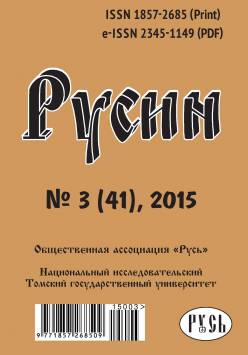Russian social thought in the search for national identity: the birth of Russian nationalism (the second half of the XIX century)
In the Russian national discourse are two fundamentally different approaches. First implemented in the framework of conservative and liberal areas of social and political thought and based on the recognition of non-disintegration of the Russian state and the provision of political autonomy to national regions, as well as the idea of the Russian nation as the most important instrument for the implementation of social and political projects. An alternative approach was implemented revolutionary socialists and was based on the belief in the social determinism of national processes and, consequently, on the denial of the role of the national factor in the perspective of social and political practice. Therefore, the inclusion of the flow in an ail-Russian national discourse only determines the interest in national movements as possible allies in the struggle against the tsarist government. The most important marker species of Russian nationalism was the format of relations between nation and state. Etnotsentristy (Slavophiles) seen in the Russian ethnic group dominant force, under certain conditions, the ability to form a Russian national state and assimilate other ethnic groups. The Imperials (liberal and conservative) suggested that a powerful centralized state will establish a single Russian nation as a political entity, while maintaining polyethnicity. In the framework of liberal nationalism was unconditional recognition of the need for early implementation of the legal equality of the representatives of all the peoples of Russia. Representatives of the conservative imperial nationalism allowed the persistence of inequalities in the indefinite future, and conditioning of its liquidation loyalty to the nations of the empire. Russian national projects face competition of other projects of national elites: a pan-nationalist doctrines (Polish, German, Swedish), and emerging nationalism in the ethnic regions of the Russian Empire, which led to an adjustment. Gradually, the representatives of the various currents of political thought of maturing belief in the inefficiency of Russian nationalism and national policy in light of changes in the domestic and foreign situation. Slavophiles abandon the principle of non-interference of the state in the sphere of international relations, requiring him to support their projects, while trying to find support in the idea of a common Slavic unity. Imperials-conservatives are divided into two areas. One of them demanded a complete renunciation of national accounting factor in nation building. The second in favor of strengthening the role of the Russian people, demonstrating a certain convergence with ethno-nationalism.
Keywords
socialism, liberalism, conservatism, national discourse, slavophilism, nationalism, nation, либерализм, социализм, славянофильство, консерватизм, национальный дискурс, национализм, нацияAuthors
| Name | Organization | |
| Kudryashev Vyacheslav | Tomsk State University | kvn18011962@yandex.ru |
References
_12_2014_1423748353.jpg)
Russian social thought in the search for national identity: the birth of Russian nationalism (the second half of the XIX century) | Rusin. 2014. № 4 (38). DOI: 10.17223/18572685/38/9
